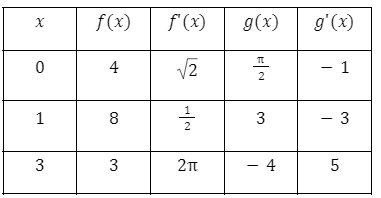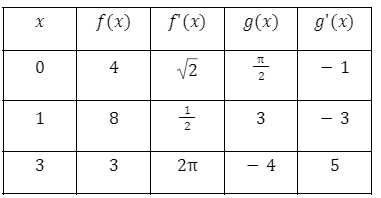Trigonometric
Differentiation
normal lines
What is the derivative of
y = 3x^2
?
y' = 6x
Find the derivative of
y = 3x^2 sin x
3x^2 cos x + 6x sin x
Find y' if
y = (3x - 9)^4
12(3x - 9)^3
Find the derivative implicitly
x^2 + y^2 = 30
y' = - x/y
Find the derivative of
f(x) = 3sinx - 2cosx
3cosx + 2sinx
cos^(-1)x^3
-(3x^2)/(sqrt(1-x^6)
ln4x^3
3/x
what is the slope of the tangent line? the tangent line is
5x-2.5=-2(y+3)
slope =
-5/2
Find the derivative of
f(x) = 5
0
f(x) = (3x - 2x^2)(5 + 4x)
-24x^2 + 4x + 15
Find the derivative of
f(x) = sin 4x
4 cos 4x
sin x + 2cos 2y = 1
y' = cosx/(4sin2y)
y=csc3x^5
y'=-15x^4csc3x^5cot3x^5
sin^-1(-x^2)
-(2x)/sqrt(1-x^4)
y=e^(sinsqrtx)
cossqrtx/(2sqrtx )(e^sinsqrtx)
what is the normal line of
f(x)=-1/2x^2+2x+1
y=1(x-3)+2.5
Find the derivative of
f(x) = 6x^3 + x - 2
18x2 + 1
Find the derivative of
y = (5x - 2)/(x^2 + 1)
(-5x^2 + 4x + 5)/(x^2 + 1)^2
Find y' if
y = (9x^2 + 4)^(1/3)
(6x)/(9x^2 + 4)^(2/3
(y - 2)^2 = 4x - 12
y' = 2/(y - 2)
y=sec5x^5
y'=25x^4sec5x^5tan5x^5
cot^-1 4x^2
-(8x)/(16x^4+1)
f(x)=sqrt(5+e^(2x)
e^(2x)/sqrt(5+e^(2x)
write the equation for the normal line to
f(x)=(1+x)^(-1/2), x=3
y=16(x-3)+1/2

h(x)=f(x)*g(x), h'(3)= ?
15-8pi
Find the derivative of
f(x) = (2x + 5)/(x)^(1/2)
(2x - 5)/(2x^(3/2)
f(x) = sin^3 4x
Find f'(x)
12sin^2 4x cos 4x
x^3 - 3x^2y + 2xy^2 = 12
y' = (-3x^2 + 6xy - 2y^2)/(-3x^2 + 4xy)

w(x)=g(x)sinx, w'(0)=?
pi/2
tan^-1 -x^5
-(5x^4)/(x^10 +1
y=3^(x^2-1)
2xln3(3^(x^2-1))
Write the equation for the tangent line when (2,1)
x^2y+y^2x=6
y'=5/8(x-2)+1
Find the third derivative of
5x^5+2x^2+4x
300x^2
Find the Derivative of
y= (2x+1)/(2x-1)
y'=-4/(2x-1)^2
Find
f'(theta)
f(theta)=secsqrt(theta)
(secsqrt(theta)tansqrt(theta))/(2sqrt(theta))
x^2y+y^2x=6
y'=(-2xy-y^2)/(x^2+2xy)
y=x^3tanx
y'=x^3sec^2x+3xtanx
y=sin^(-1)(x/3)
1/(3sqrt(1-x^2/9)
g(x)=4xlnx
4+4lnx
if 5x^2+2x^2y+y^2=8
then y' at the point (1,1) is?
y'=-7/2